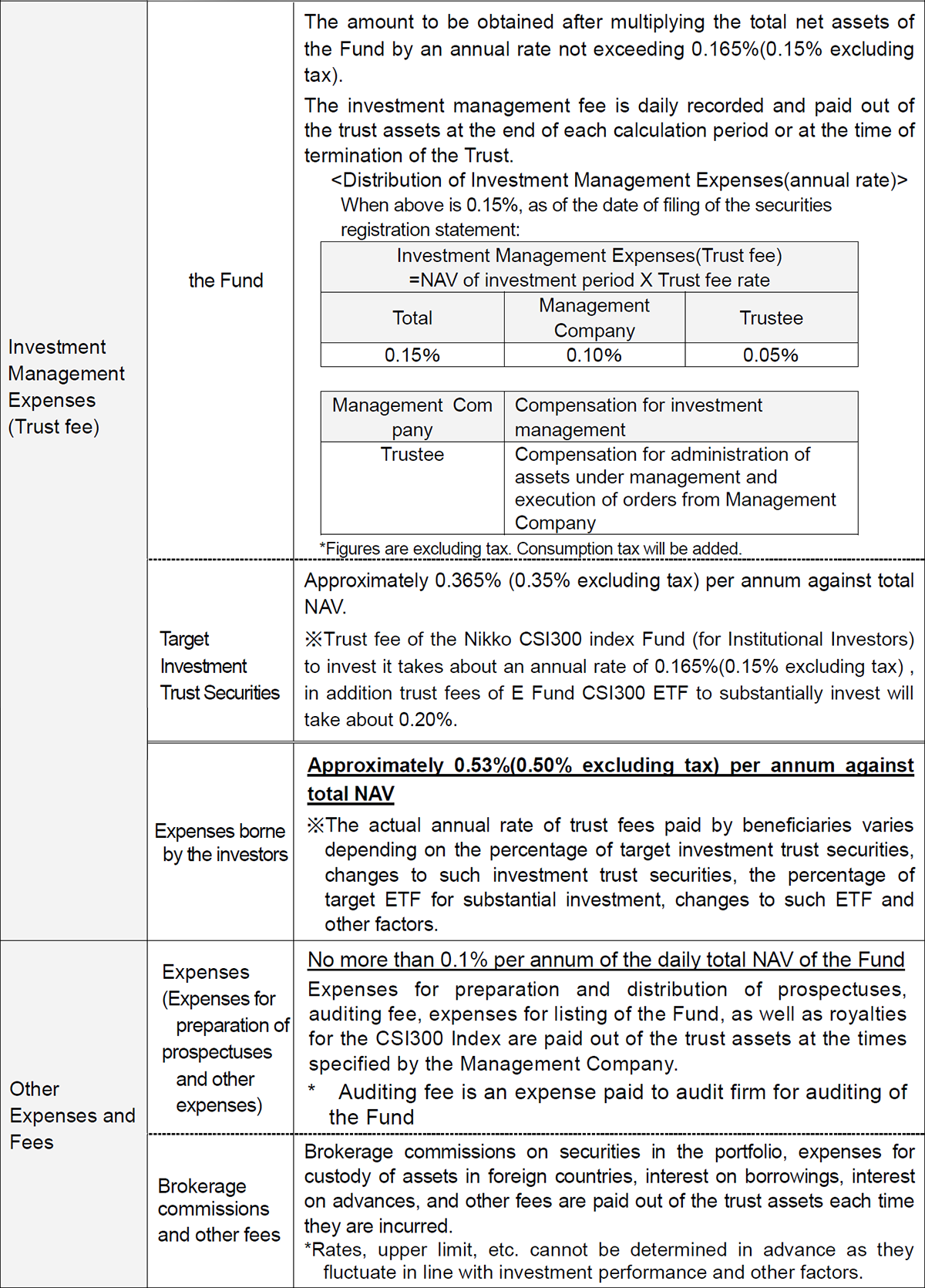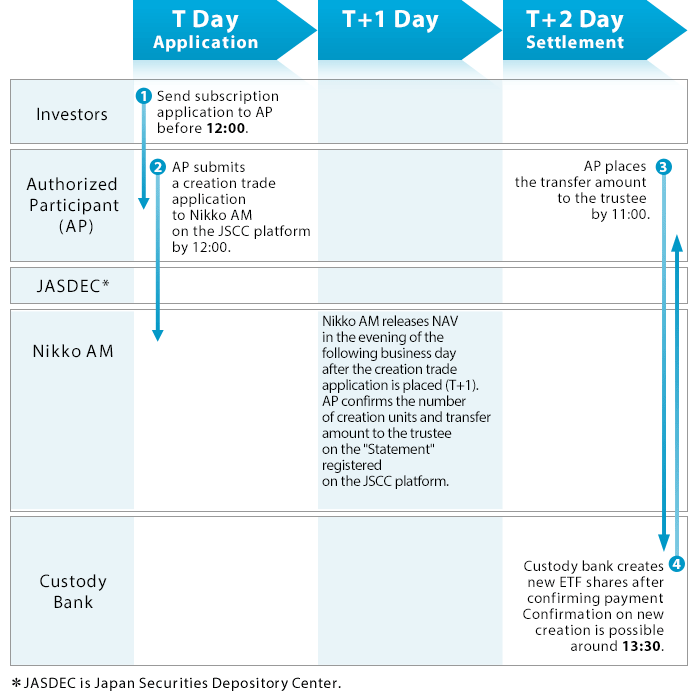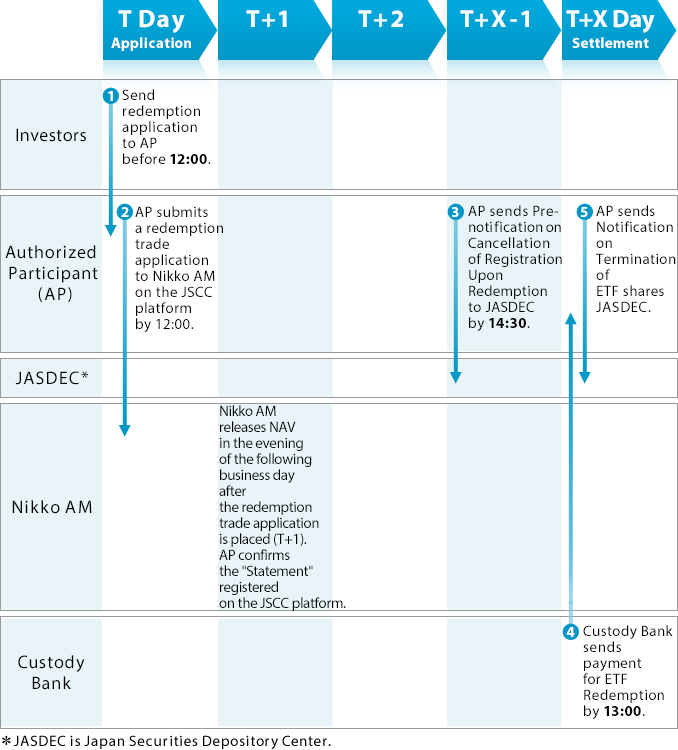On September 1, 2025, Nikko Asset Management Co., Ltd. will change its name to Amova Asset Management Co., Ltd.
This is a Fund that invests in investment trust securities that target price performance linked to the yen-converted China Securities Index (CSI) 300 Index. The Fund mainly consists of investments in Investment trust securities listed on a Chinese financial exchange and stock issues adopted for the CSI300 Index, and aims to keep the Net Asset Value (NAV) closely linked with the performance of the Index on a yen-equivalent basis.
Key information
| Name: | Listed Index Fund China A Share (Panda) E Fund CSI300 | |
| Code: | 1322 |
Net Asset Value and Performance
Structure of the Fund
This Fund of Funds invests in investment trust securities.
- Nikko CSI300 Index Fund (for Institutional Investors)
The Fund will invest mainly in "China A Share CSI300 Index Mother Fund," and seeks to see its performance to correlate with the movement of the yen-converted CSI300 Index. - (Reference) Nikko AM China RMB A-Share CSI300 Index Mother Fund
The Fund will invest mainly in E Fund CSI300 ETF*, Yuan-denominated shares of Chinese companies, and seeks to see its performance to correlate with the movement of the yen-converted CSI300 Index.
*E Fund CSI300 ETF
This RMB denominated foreign investment trust is listed on a Chinese financial exchange and aims to be linked to the CSI 300 index. - Money Open Mother Fund
This Fund aims to ensure stable returns by investing in public and corporate bonds.
Fund Structure

| Fund Name | Listed Index Fund China A Share (Panda) E Fund CSI300 Open-end/Overseas/Equities/ETF/Index type |
| Listed Exchange | Tokyo Stock Exchange |
| Issue Code | 1322 |
| Targeted Investments | The Fund invests in securities investment trusts that target price performance linked to the Chinese Security Index (CSI) 300 Index (yen-equivalent basis) |
| Date Listed | 11 April 2008 (launched on 7 April 2008) |
| Exchange Trading Unit | 1 unit |
| Trust period | Unlimited |
| Computation Period | From 21 January of each year to 20 January of the following year |
| Closing Date | 20 January of each year |
| Dividends | All revenue from dividends arising from the trust assets will be, in principle, paid as dividends on the last day of the fiscal year after deducting expenses. *There is no guarantee on the payment or the amount of dividend. |
Fund Expenses
■Expenses to be borne directly by investors
| Subscription Fee | The amount to be set independently by Distributors *Please contact your Distributor for further details. *Subscription Fee is compensation for explanation and information providing about the Fund or investment environment, and is also including expense of clerical processing of the subscription. |
| Exchange Fee | The amount to be set independently by Distributors *Please contact your Distributor for further details. *Exchange Fee is compensation for clerical processing of the exchange. |
| Amount Retained in Trust Assets | An amount calculated by multiplying NAV at the time of a redemption by 0.6% (per unit) |
■Costs paid indirectly by the customer for the trust assets (paid from the fund)
| TER (Total Expense Ratio) |
0.73% (TER includes Trust Fee, management fee and other costs below) Please refer to the prospectus for details. |

The total amount of expenses of the Fund to be borne by investors varies according to holding length and investment status, and thus cannot be shown.
Major Investment Restrictions
|
Trustee Companies
|
The Chinese Securities Index (CSI) 300 consists of 300 stock with the highest total market value and liquidity of all the "A" shares listed on the Shanghai and Shenzhen stock exchanges. It is the key index for Chinese stock prices. The Index is calculated using the weighted average method of total market value, a method that includes the adjustment of floating share ratios. The computation sets 31 December 2004 as the base time with a total market value of 1,000, and then the subsequent total market value is indexed.
The continuity of Index is secured by adjusting the total market value in a manner that precludes any influence of paid capital increases, new listing and delisting, which are not considered valid indicators of market conditions.

Further Information
Japan Exchange Group (JPX)
Japan Exchange Group publishes summaries and lists of the ETFs, as well as other valuable information on their website.
S&P Global
- Listed ETF iNav
Please click this link to see the iNAV.
*Link to external sites.
Copyright
The CSI 300 Index is calculated by China Securities Index Co., Ltd (CSI). CSI and the Shanghai and Shenzhen stock exchanges will take all the necessary measures to ensure the accuracy of the CSI 300 Index. However, CSI and the Shanghai and Shenzhen stock exchanges, regardless of negligence, will not assume any responsibility for errors, nor will they assume any responsibility to publicize errors related to the CSI 300 Index. All copyrights, including the value of the index and the shares incorporated in the Index, belong to CSI.
- 5 Mar 2025 — Earnings Report for Fiscal Year ended Jan 2025
- 2 Sep 2024 — Interim Earnings Report for Fiscal Year ending Jan 2025
- 4 Mar 2024 — Earnings Report for Fiscal Year ended Jan 2024
- 1 Sep 2023 — Interim Earnings Report for Fiscal Year ending Jan 2024
- 3 Mar 2023 — Earnings Report for Fiscal Year ended Jan 2023
- 2 Sep 2022 — Interim Earnings Report for Fiscal Year ending Jan 2023
- 4 Mar 2022 — Earnings Report for Fiscal Year ended Jan 2022
- 2 Sep 2021 — Interim Earnings Report for Fiscal Year ending Jan 2022
- 5 Mar 2021 — Earnings Report for Fiscal Year ended Jan 2021
- 2 Sep 2020 — Interim Earnings Report for Fiscal Year ending Jan 2021 (21 Jan 2020 - 20 Jul 2020)
- 4 Mar 2020 — Earnings Report for Fiscal Year ended Jan 2020 (21 Jan 2019 - 20 Jan 2020)
- 2 Sep 2019 — Interim Earnings Report for Fiscal Year ending Jan 2020 (21 Jan 2019 - 20 Jul 2019)
- 5 Mar 2019 — Earnings Report for Fiscal Year ended Jan 2019 (21 Jan 2018 - 20 Jan 2019)
- 31 Aug 2018 — Interim Earnings Report for Fiscal Year ending Jan 2019 (21 Jan 2018 - 20 Jul 2018)
- 5 Mar 2018 — Earnings Report for Fiscal Year ended Jan 2018 (21 Jan 2017 - 20 Jan 2018)
- 31 Aug 2017 — Interim Earnings Report for Fiscal Year ending Jan 2018 (21 Jan 2017 - 20 Jul 2017)
- 2 Mar 2017 — Earnings Report for Fiscal Year ended Jan 2017 (21 Jan 2016 - 20 Jan 2017)
- 2 Sep 2016 — Interim Earnings Report for Fiscal Year ending Jan 2017 (21 Jan 2016 - 20 Jul 2016)
- 4 Mar 2016 — Earnings Report for Fiscal Year ended Jan 2016 (21 Jan 2015 - 20 Jan 2016)
- 2 Sep 2015 — Interim Earnings Report for Fiscal Year ending Jan 2016 (21 Jan 2015 - 20 Jul 2015)
- 5 Mar 2015 — Earnings Report for Fiscal Year ended Jan 2015 (21 Jan 2014 - 20 Jan 2015)
- 2 Sep 2014 — Interim Earnings Report for Fiscal Year ending Jan 2015 (21 Jan 2014 - 20 Jul 2014)
- 5 Mar 2014 — Earnings Report for Fiscal Year ended Jan 2014 (21 Jan 2013 - 20 Jan 2014)
- 3 Sep 2013 — Interim Earnings Report for Fiscal Year ending Jan 2014 (21 Jan 2013 - 20 Jul 2013)
- 6 Mar 2013 — Earnings Report for Fiscal Year ended Jan 2013 (21 Jan 2012 - 20 Jan 2013)
- 31 Aug 2012 —Interim Earnings Report for Fiscal Year ending Jan 2013 (21 Jan 2012 - 20 Jul 2012)
Authorized Participants
- ABN AMRO Clearing Tokyo Co., Ltd.
- BNP Paribas Securities (Japan) Limited
- Citigroup Global Markets Japan Inc.
- Goldman Sachs Japan Co.,Ltd.
- SMBC Nikko Securities Inc.
- Nomura Securities Co., Ltd.
- Phillip Securities Japan, Ltd.
Daily Creation and redemption are based on ETF's NAV calculated in early evening. Confirm non-tradable days by referring to trading calendar on our official homepage. Basket for creation is continually-updated on our official homepage.
Basically sell/buy underlying asset at last price of T day's market.
The flow chart below is showing the creation/redemption process for Nikko AM ETFs. Please note that transactions cannot be processed for days on which applications are not accepted.
Creation Flow for Cash Creation/Redemption Type ETFs

Redemption flow for Cash Creation/Redemption Type ETFs

Investors are not guaranteed the investment principal that they commit. Investors may incur a loss and the value of their investment principal may fall below par as the result of a decline in market price or NAV. All profits and losses arising from investments in the Fund belong to the investors (beneficiaries). This fund is different from saving deposit.
This Fund invests mainly in equities. Therefore, due to falls in stock prices or deterioration in financial standing or business results of stock issuers, that NAV may fall and the Fund may incur losses. Losses could also be incurred due to exchange rate fluctuation when investing in assets denominated in foreign currencies.
Major risks for the target investment trust securities are as follows:
1. Price Fluctuation Risk
Stock prices fluctuate as they reflect information on projected business growth or profitability of their issuers as well as any update of such information. They also fluctuate as they are affected by economic and political conditions in Japan and abroad. There is a risk that the Fund could incur material losses if any unexpected change occurs in stock price movements or liquidity.
Stocks of emerging countries tend to fluctuate more widely than the average of overall equity market in advanced countries, and such fluctuation may significantly affect the Fund's NAV.
Public and corporate bonds contain a risk of price fluctuation due to interest rate fluctuation. In general, when interest rates rise, bond prices decline, which could result in a decline in the Fund's NAV. However, the level of price fluctuation differs among bonds depending on their remaining period to the maturity, coupon rates and other issuance conditions.
2. Liquidity Risk
There is a risk that the Fund could incur unexpected loss especially when the market size or trading volume is small, as purchase and selling prices of securities are more susceptible to the impact of trading. Such risk includes possibilities that certain stocks in the Fund's portfolio cannot be sold at prices expected to be realized or at valuation prices and that transaction volume is limited irrespective of the level of prices.
Stocks of emerging countries tend to be more susceptible to liquidity risk due to their smaller market size and trading volume when compared to those of advanced countries.
3. Credit Risk
There is a risk that the Fund could incur material loss at the advent of any serious crisis that directly or indirectly affects the business of a corporation in which the Fund invests. Prices of stocks may decline substantially (possibly to zero) due to any default or anticipated bankruptcy of their issuer, which could ultimately lead to a decline in the Fund's NAV.
In the case that a default occurs or is anticipated to occur with an issuer of public or corporate bonds or short-term financial assets, the price of such public/corporate bonds or assets is expected to decline (possibly even to zero). This could result in a decline of the Fund's NAV. If such default actually occurs, it is highly possible that invested funds cannot be recovered.
4. Currency Fluctuation Risk
Regarding foreign currency-denominated assets, when the yen is stronger than these currencies, the Fund's NAV is expected to decline in general.
In general, currencies of emerging countries tend to fluctuate more than those of developed countries.
5. Country Risk
There is a risk that the Fund could incur material losses as a result of unexpected market fluctuation or flow of funds, including the occurrence of any state of emergencies in a target country (such as a financial crisis, government default due to financial reasons, significant policy change, introduction of new regulations including asset freezes, natural disasters, coups, significant change of regime or war). In such cases, the fund may not be managed as planned.
Emerging countries in general tend to be insufficient or slow in information disclosure, or in the dispatch of accurate information, when compared to advanced countries.
6. Security-lending Risk
Lending of securities is generally accompanied with a risk of uncertainty on the side of a counterparty (such as the possibility of bankruptcy, which could lead to a default or cancellation of lending agreement). Thus, the Fund could incur unexpected loss as a result of securities lending. In the event of any default or cancellation of a lending agreement, which would require liquidation using a collateral set in the lending agreement, the cost of buying back the securities may exceed the collateral value, due to price fluctuations in the market. In such cases, the Fund is required to pay the difference, which could cause the Fund to incur losses.
Risk and matters to consider concerning Yuan-denominated stocks of Chinese companies
- Risk of Repatriation Delay
- The State Administration of Foreign Exchange (SAFE) of China can impose restrictions on the transmission of capital or profits to Japan, on the grounds of a foreign currency balance situation or for other reasons. Therefore, trust properties might not be transmitted as scheduled. In the case of such delay, payment of exchange proceeds, etc. might be delayed accordingly.
- Limitations and restrictions concerning the securities market
- There are various limitations and restrictions employed within the Chinese securities market and securities investment framework (including the market infrastructures such as payment systems). These limitations or restrictions are introduced mostly by the China Securities Regulatory Commission (CSRC) or by SAFE at their respective discretion.
- In the case that any regulation on foreign investments to China or money transfers to foreign countries is introduced emergently or added as a result of any policy change, such regulation may affect the target market for investment adversely and significantly.
Risk of disparity between the yen-converted CSI300 Index and the NAV
Whereas the Fund seeks to match the NAV volatility with that of the yen-converted CSI300 Index, consistency between them cannot be guaranteed because of the following factors concerning the Fund and target securities for investment:
- A time lag between fund inflow and actual purchase of investment trust securities;
- The possibility of making investment in issues other than those that comprise the CSI300 Index; the potential market impact from trading of individual issues when portfolio adjustment needs to be made due to any change in selection of issues for the CSI300 Index or capital transfer; expenses to be burdened by the Fund including trust fees, brokerage commissions, audit costs, etc.
- The management fee from securities or dividends loan of incorporated issues.
- When derivative transactions such as futures are made, there may be disparity between the price movements of all or some of such transactions and that of the CSI300 Index.
Discrepancy between NAV and market prices at financial instruments exchanges
The Fund is listed in the Tokyo Stock Exchange and the units are traded on the Exchange. Market prices of Units are influenced mainly by the size of demand for the Fund, its performance, and the attractiveness of it to investors in comparison with their other investments. Therefore, it is impossible to predict whether or not the Units will sell in the market above or below the NAV.
*Since prices of the investment trust securities targeted by the Fund fluctuate due to the impact of these factors, the Fund itself is subject to the same risks.
*Such factors contributive to fluctuations in the NAV are not limited to those described above.
Additional Considerations
- This material was produced for the purpose of providing information on the "Listed Index Fund China A Share (Panda) E Fund CSI300" offered by Nikko Asset Management, and is sales material provided to investors in order to enhance their understanding of the Fund.
- The provisions stipulated in Article 37-6 of the Financial Instruments and Exchange Act ("cooling-off period") are not applicable to Fund transactions.
- This Fund differs from deposits or insurance policies in that it is not protected by the Deposit Insurance Corporation of Japan or the Policyholders Protection Corporation of Japan. Furthermore, units purchased from registered financial institutions, such as banks, are exempted from compensation by the Japan Investor Protection Fund.
- When the Fund faces big redemption causing short term cash requirement or sudden change in the main trading market condition, there can be temporal decline in the liquidity of holding assets, resulting in the risks that Fund unable to trade securities at the expected market prices or appraised prices, or encounters limitation in trading volume. This may result in the negative influence on NAV, suspension of redemption applications, or delay in making payment of redemption.
- When applying to invest in the Fund, please make the decision to invest carefully after taking the time to read the delivered pre-agreement document and other relevant materials in detail.


